Shopify Vs Etsy: Why Etsy Sellers Are Leaving for Shopify? [2024]
If you are seeking an eCommerce solution for your first time selling online, you might find yourself stuck between several online marketplaces and eCommerce platform options like Shopify vs Etsy. So, what do these top choices compare together? And what works better for your business? LitExtension, the #1 Shopping Migration Service, will address these concerns in the following lines.
Keep reading to get:
- An overview comparison of Etsy vs Shopify;
- A full-feature differentiation between Shopify and Etsy;
- Which is the best solution for your business, Shopify or Etsy?
- Can you sell on both platforms?
Without any delay, let’s get straight away to it!
Shopify or Etsy: An Overall Comparison
What is Shopify?
Shopify is a SaaS (Software as a Service) eCommerce solution founded in 2006 and has evolved to become one of the greatest eCommerce platforms ever since. The fully hosted nature makes it simple for merchants to build sophisticated online stores without the tech know-how. As of the writing, Shopify has powered 4,8+ million online stores across the globe (Source: BuiltWith).
The platform comes with all of the functionality you’ll need to run your store and grow your brand. It also has integrations with analytical report tools to help you manage your business performance more effectively. What’s best is that Shopify allows you to test out the features for free within 3 days; then, you can pay $1/month for the next three months to extend your stay.
It has been easy to use and very helpful in creating an effective online presence for my business. The platform is intuitive, allowing me to quickly create pages, customize designs, add products, manage payments and shipping options, as well as track analytics. – Patrick L., UK.
Click on our detailed Shopify review for more information about this platform, or browse the video right below.
What is Etsy?
Some might wonder in mind, “Is Etsy popular?” or “Is Etsy an eCommerce platform?”.
Since its inception in 2005, Etsy, on the other hand, has been an extremely popular marketplace. With Etsy, merchants can sign up for online kiosks and share space with other sellers. In early 2023, over 7,4 million merchants sold products through the Etsy platform, and there’s a total of 89,9 million active buyers globally (Source: Statista).
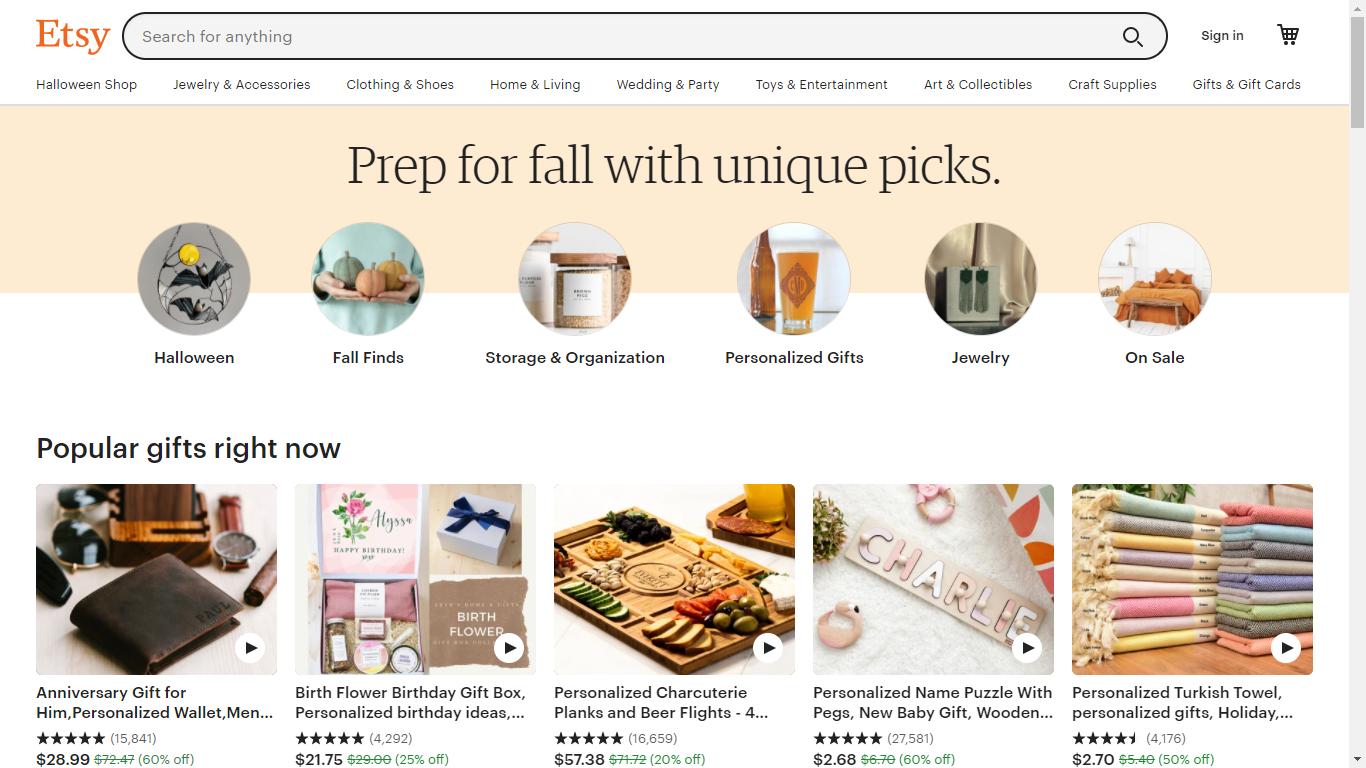
Etsy would be ideal for people who wish to start small with some of the most popular things, such as handmade masterpieces, vintage items, and craft supplies. The marketplace allows you to give the most concentration on developing your products, customer retention, and promotions. It does, however, come with the inability to manage your store, expand your brand, and scale it.
In late 2016, Etsy Pattern, the website platform version of Etsy, was introduced, allowing customers to sell unique things on their own standalone websites. You’ll have fewer product restrictions with Etsy Pattern than with the Etsy marketplace, and it’s free to use for the first 30 days.
Etsy is like my creative haven! It’s not just a platform; it’s a warm community that celebrates uniqueness. The easy-to-use setup made it a breeze to share my creations with the world – John, US.
Shopify vs Etsy: Pros & Cons
Shopify Pros & Cons
[wptb id=69290]
Advantages of Shopify: What’s the main reason for using Shopify over Etsy?
- Powerful eCommerce tools: Shopify provides you with a comprehensive range of eCommerce solutions that cover every area of your online business’s growth. A robust inventory management system, abandoned cart recovery, multiple payment choices, and other features are all required.
- Ability to build brand identities: Instead of being remembered as an Etsy seller only, you can build an online store on the Shopify platform and customize the layout, logo, etc., to go along with your brand identity.
- Great scalability: Shopify offers a variety of pricing plans for businesses of different sizes, from tiny to large. You can control how your brand grows, choose the upper grade for more features, and add apps.
Shopify Cons:
- Customer exposure: With a standalone website, you will be completely in charge of SEO, advertisements, and email marketing in order to show as many of your products to your buyers as possible.
- Limited customization options: Due to the hosted nature and its proprietary codebase, you’ll have less control over your site. Therefore, your store customization depends largely on third-party applications and plugins.
- Stacking up cost for apps: If you want to expand your business, you may need to buy a lot of apps to add new features.
Etsy Pros & Cons
[wptb id=69296]
Advantages of Etsy: What’s the main reason for using Etsy over Shopify?
- Customer exposure: Etsy helps its merchants reach a huge number of clients quickly because it is a very popular marketplace.
- Easy to use: Simply create an account, upload product photographs, select prices and promotions, and then go!
- Low cost: If you choose to go with the default plan (Etsy Standard), you don’t need to pay any subscription costs. Instead, you only need to be responsible for listing products and transaction fees.
Etsy Cons:
- Lack of control: You won’t be able to change the look of your storefront because you’ll be sliding products alongside other merchants in the same place. This makes it difficult for you to approach customers through visual appeal, and you’ll have to rely on ratings instead.
- Difficult to build brand identities: When buying a product from your shop on Etsy, buyers mostly develop loyalty to the marketplace itself, not your shop.
- Fierce competition: As you will share the selling space with other sellers any time now, you will have to make your listings stand out to catch buyers’ attention before others do.
Need Help To Migrate Your Store?
If you intend to migrate from Etsy to Shopify, LitExtension offers a great migration service that helps you transfer your data from the current eCommerce platform to a new one accurately and painlessly with utmost security.
Shopify vs Etsy: A Head-to-Head Comparison
If you are an intuitive learner, take a look at the short comparison table and see how Shopify vs Etsy compete with each other.
[wptb id=69157]
Pricing
Price is the most important factor when considering an eCommerce solution for your business, and the same is true when comparing Shopify vs Etsy. Is Shopify cheaper than Etsy? We’ll find out in the following lines.
Before we start, it’s worth noting that prices and fees are completely different in our Shopify vs Etsy comparison. While prices refer to the amount a merchant is willing to pay for the service (Shopify plans or Etsy packages), fees imply the costs incurred during the sales process (listing fees, transaction fees, etc.)
Quick verdict
For the first round in our Shopify vs. Etsy comparison, it’s a draw! Selling on Etsy requires no monthly running costs, but Shopify provides greater features and tools with its diverse pricing plans.
Shopify Pricing
As said, you can first experience Shopify’s free trial within 3 days. Onboarding tutorials are very user-friendly so that you can rapidly grasp what Shopify can do for you, or prolong your trial for 3 more months for only $1 each. After that, determine one of Shopify’s pricing plans, which corresponds to the five levels of scalability, to build the online store of your dreams.
There are 05 pricing tiers for you to choose from: Starter, Basic, Shopify, Advanced, and Shopify Plus. The higher the plan, the more features you’ll have access to. Besides that, registering for an annual plan could save your company a lot of money in the long run.
[wptb id=68037]
Etsy Pricing
Unlike Shopify, Etsy only features two subscription packages: Etsy Standard and Etsy Plus.
When you sign up for an Etsy account, you will automatically subscribe to Etsy Standard. It is a suite of selling tools and capabilities that comes with no Etsy price at all. You must, however, set aside a portion of your revenue for listing and transaction fees. These Etsy costs will be detailed later in this article.
On the contrary, Etsy Plus is completely optional. So what is Etsy Plus, and how much is Etsy Plus?
Etsy Plus is the platform’s advanced package that provides you with state-of-the-art features to grow your shop to the next level. You only need to pay $10/month for Etsy Plus subscription and get the following benefits:
- Monthly credits for listings and Etsy Ads;
- Access to discounted custom web address for your Etsy shop;
- Restock requests for sold-out items;
- Advanced shop customization options;
- Discounts on custom packaging and promotional materials (boxes, business cards, signage).
If one wonders, “Is Etsy Plus worth it?“, it’s definitely a Yes. Compared to signing up for separate services on the Etsy Standard package, paying the $10 Etsy Plus cost is much more valuable.
Shopify fees vs Etsy fees
Etsy can outrun its rival a bit by providing services at zero monthly subscription, but is this the same with Etsy fees? We will find out right below.
Quick verdict
Shopify easily wins when it comes to Shopify vs Etsy fees. There are several Etsy additional fees, which may quickly add up and outweigh Shopify’s.
Shopify fees
Besides the monthly subscription costs, Shopify also charges transaction fees for each payment made in your store. These costs vary greatly depending on your Shopify pricing plan and your chosen payment method.
Shopify Payment is the platform’s in-house payment processor. You will not be charged any transaction fees if you choose this option.
In case you wish to use your familiar payment option, Shopify provides pre-integration to over 100 payment gateways, such as PayPal, Google Pay, Apple Pay, Stripe, and others. You will, however, be charged transaction fees based on your subscription plan. Alternately, it’s 2.9% + 30¢ online for the Basic Shopify plan, 2.6% + 30¢ online for the Shopify plan, and 2.4% + 30¢ online for the Advanced Shopify plan.
Etsy fees
While there’s no monthly subscription fee, you’ll need to cover listing fees, transaction fees, payment processing fees, and sometimes, some Etsy offsite ads fees.
- Etsy listing fees: Whether your items sell or not, Etsy charges $0.2 for each listing product. Plus, these items will be invalid after 4 months, so you’ll need to pay $0.2 on a per-item basis to keep them active.
- Etsy transaction fees: Every time you sell an item on Etsy, you’ll be charged a transaction fee of 6.5% for the entire purchase, including shipping & gift wrapping.
- Payment processing fees: An additional charge of 3% + $0.25 will be applied by the payment providers. While this is common and comes as standard, Etsy rates are a bit higher than other eCommerce solutions.
- Promotional fees: You only need to pay for Etsy Offsite Ads when a transaction is made from those ads. Normally, they charge from 12% to 15% on the amount you made from the sale before applying the advertising fee.
- Etsy Pattern fees: You can try the tool for 30 days without paying any Etsy Pattern cost. After the trial period, you will be charged a monthly subscription fee of $15.
Ease of Use
Quick verdict
Since both Shopify vs Etsy are easy to use, it’s hard to call out a winner. Etsy’s entire setup takes less time, while Shopify is straightforward to use, considering its library of powerful eCommerce tools.
Shopify easy of use
Whether you’ve used other eCommerce platforms beforehand or are brand new to having an online business, Shopify makes it simple to get started.
Shopify is also regarded as the most user-friendly and straightforward of all hosted platforms. Creating and setting up a Shopify store takes only a few minutes. All you need to do is sign up for a Shopify account, answer simple questions about your business, and then the Shopify dashboard will appear right in front of your eyes.
Next, you can customize your store by following the Shopify detailed checklist with simple instructions. Adding products, designing your store, and configuring settings are the three main phases you’ll need to do.
We’ve created a tutorial to set up Shopify fast for beginners, you can have a look here:
Using Etsy
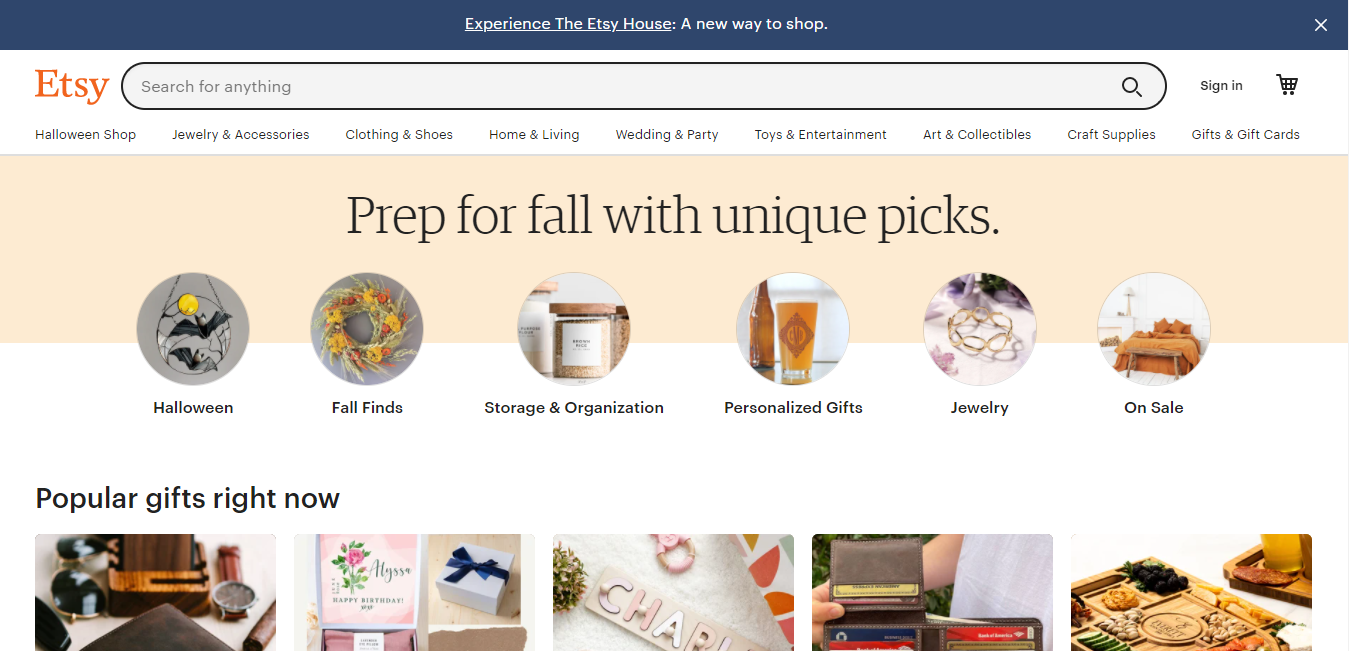
With Etsy, things are much easier. All you have to do is register an account, choose a store name, upload your products, enter billing details, and then you’re good to go! Uploading products is perhaps the most time-consuming step because it demands a lot of information. It’s also the most important part since it decides whether your product stands out on Etsy (and steals customer attraction) or not.
Still, Etsy will guide you through the process and even give you suggested options for a store name. You don’t need to build an entire store to get started on Etsy. With a lot of workloads taken away, you can be an Etsy seller within hours.
Ecommerce features
The availability of eCommerce features is necessary while deciding between selling on Shopify vs Etsy. It determines whether or not you will be able to manage your business and generate sales.
Quick verdict
When comparing eCommerce functionalities between Shopify vs Etsy, Shopify clearly outperforms Etsy, even though Shopify’s greater feature availability may come with higher fees. Etsy’s basic capabilities are sufficient if you wish to keep things simple and tiny.
Shopify eCommerce features
Even under Shopify’s basic plan, the abundance of capabilities this all-in-one solution provides retailers is amazing.
Here’s a rundown of some of the features that come included with each Shopify plan:
- Gift cards;
- Discount codes;
- Shopify POS;
- Multichannel selling;
- Abandoned cart recovery;
- SSL certificate;
- Dropshipping;
- Finance report;
- Fraud analysis;
- Blogging;
- Inventory and order management;
- Unlimited bandwidth and online storage;
- Shopify Mobile app.
Multi-channel selling is one of the most significant elements to assist you in broadening your exposure to potential consumers.
Customers who had almost completed a transaction but left the checkout page are reminded through abandoned cart recovery (unknown reasons). This ensures that no sales fall through the cracks in your wallet.
For safe transactions on your website, you’ll need an SSL certificate. As a result, this adds to the development of trust and credibility with prospects. Every package you choose will include SSL certificate authentication as a default.
Etsy eCommerce features
Etsy does a fantastic job at this point by providing you with toolkits to assist you in running your business efficiently.
You can manage orders, edit items, and respond to clients while on the road using the “Sell on Etsy app.” Etsy also offers marketing tools to help you increase traffic, expand your consumer base, and promote your brand.
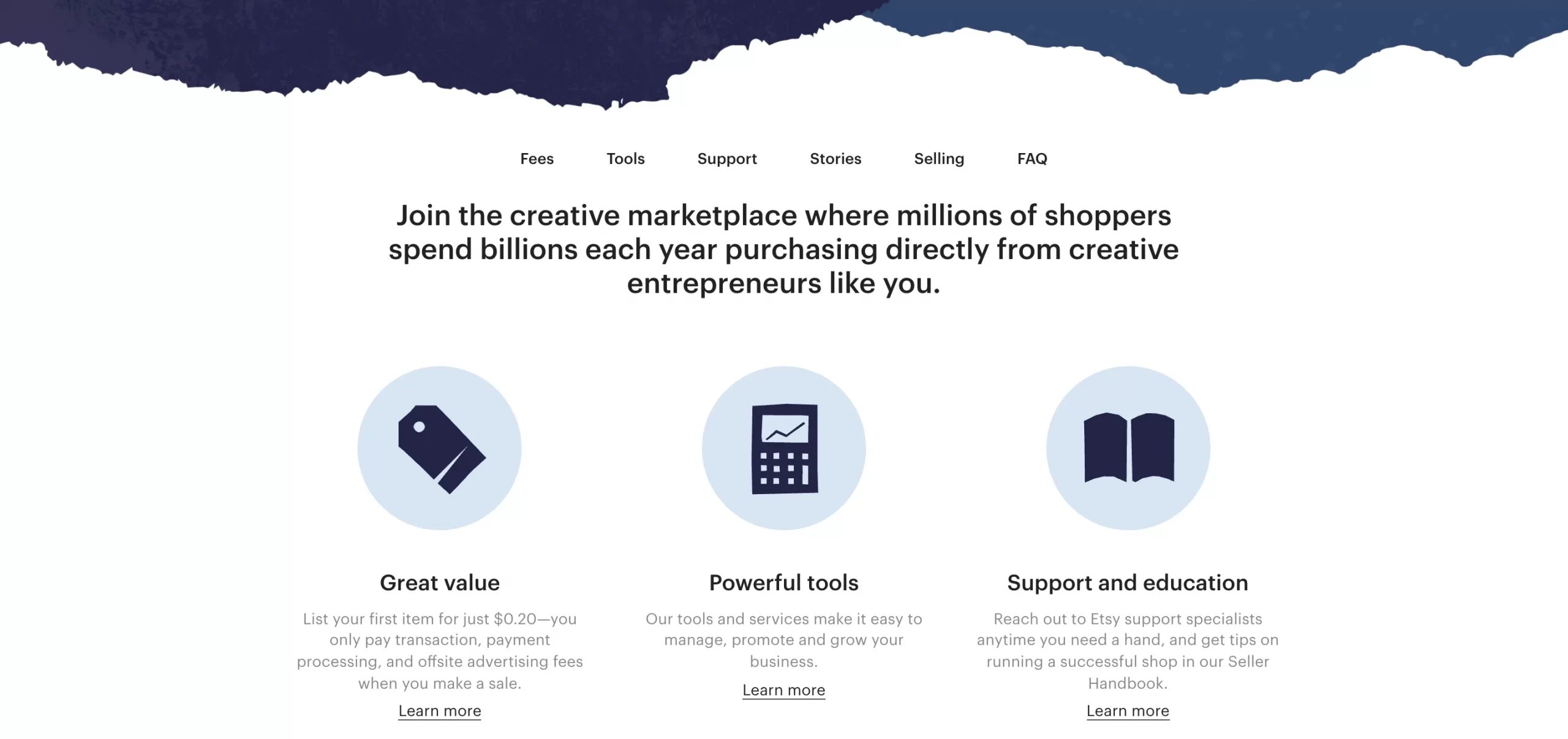
Performance analysis is critical for any business, and Etsy is a master at it. In fact, Etsy includes the analytics report function with every plan by default, which displays thorough details on performance trends and traffic sources.
Audience & traffic source
Once you’ve spent time taking stunning product photos and writing appealing product descriptions, it’s time to drive traffic to your store and show customers what you’ve got.
Quick verdict
When comparing Shopify vs Etsy in terms of audience & traffic source, it’s visible that Etsy makes it easier for customers to find your products thanks to its popularity and ready-made customer base. Shopify, however, provides you with plenty of tools to fully control how you can connect with your potential customers.
Shopify
Selling on an eCommerce platform like Shopify means that you have to attract a steady stream of traffic to your online store. It’s possible to promote your online business on Google and social media channels or, alternatively, harness the power of organic traffic through SEO techniques.
As luck would have it, Shopify comes with numerous effective solutions. Besides the powerful email marketing plugins, Shopify provides access to hundreds of SEO apps and multichannel tools across Facebook, Instagram, and top marketplaces.
Although it requires a lot of effort and work, you’ll have full control over how your brand connects with customers and creates effective marketing campaigns.
Etsy
On the other hand, Etsy is a popular market with about 90 million buyers each month. Most of them are repeat customers coming for vintage items or handmade stuff. As such, it’s not hard to see why many eCommerce beginners choose to start with Etsy.
That said, the buyers don’t look for your products specifically. They just search for Etsy and find a suitable item among roughly 100 million products. Therefore, you must think of how to stand out from the crowd on your own.
Design flexibility
There should be no denying that design flexibility is not a strength for both Shopify vs Etsy. However, there are significant differences between Shopify vs Etsy to look at.
Quick verdict
Considering the lack of design flexibility for both Shopify and Etsy, Shopify still wins this battle with multiple free modern themes.
Shopify Themes
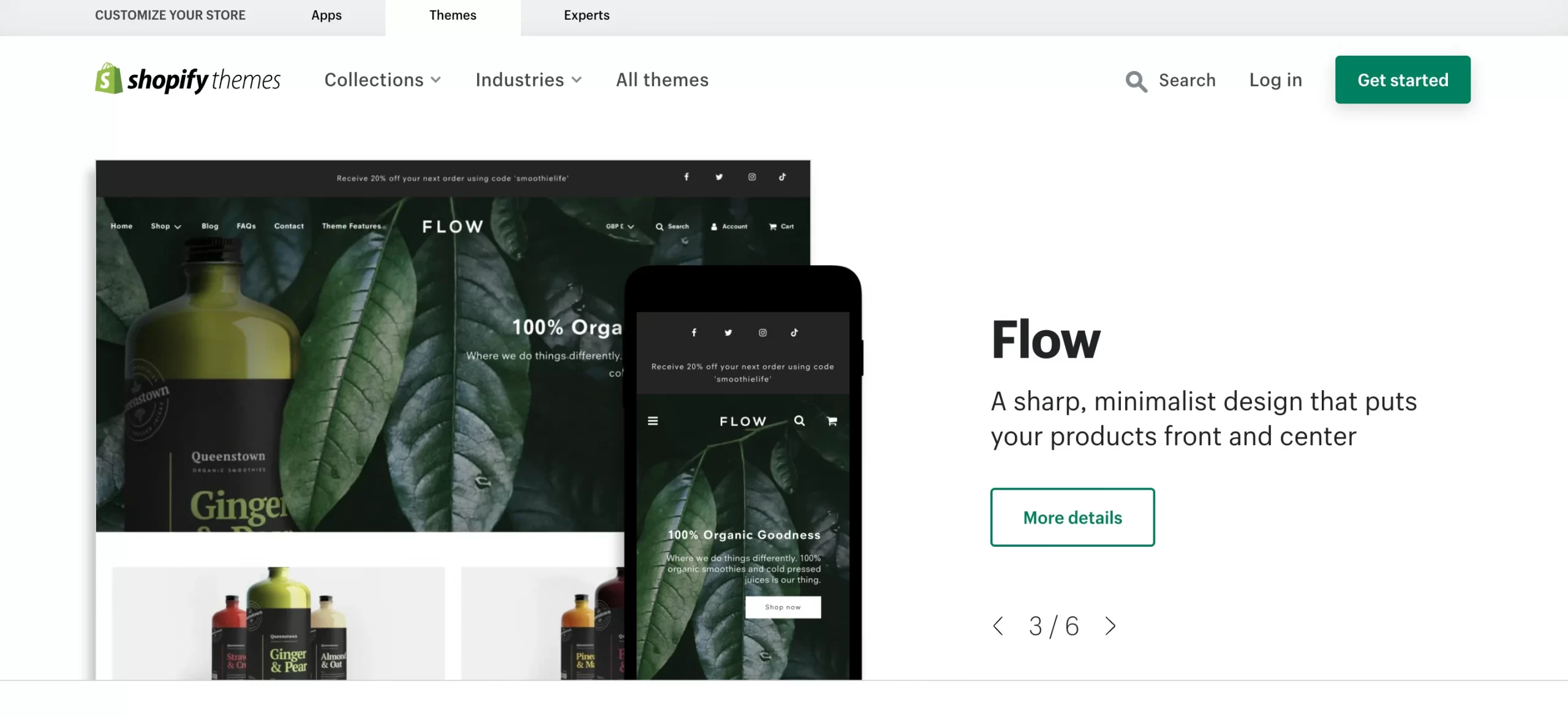 With Shopify, you will get access to 100+ themes including both free and paid. All of these themes can be found on the Shopify themes store, with continuous updates of new themes available. Shopify themes serve many business types so that you can choose the most suitable for your website, ranging prices for paid themes from $150 to $350.
With Shopify, you will get access to 100+ themes including both free and paid. All of these themes can be found on the Shopify themes store, with continuous updates of new themes available. Shopify themes serve many business types so that you can choose the most suitable for your website, ranging prices for paid themes from $150 to $350.
Once you have selected a theme, you can customize the content section on the home page. Moreover, all Shopify themes are made SEO and mobile-friendly, which is very important to improve user experience. You can swiftly switch between themes anytime you like. However, some themes require content reformatting.
You can customize your eCommerce website’s design using a Template editor, which requires no HTML or CSS knowledge. Besides, you can also turn your HTML and CSS into a beautiful eCommerce website appearance using Shopify Liquid. 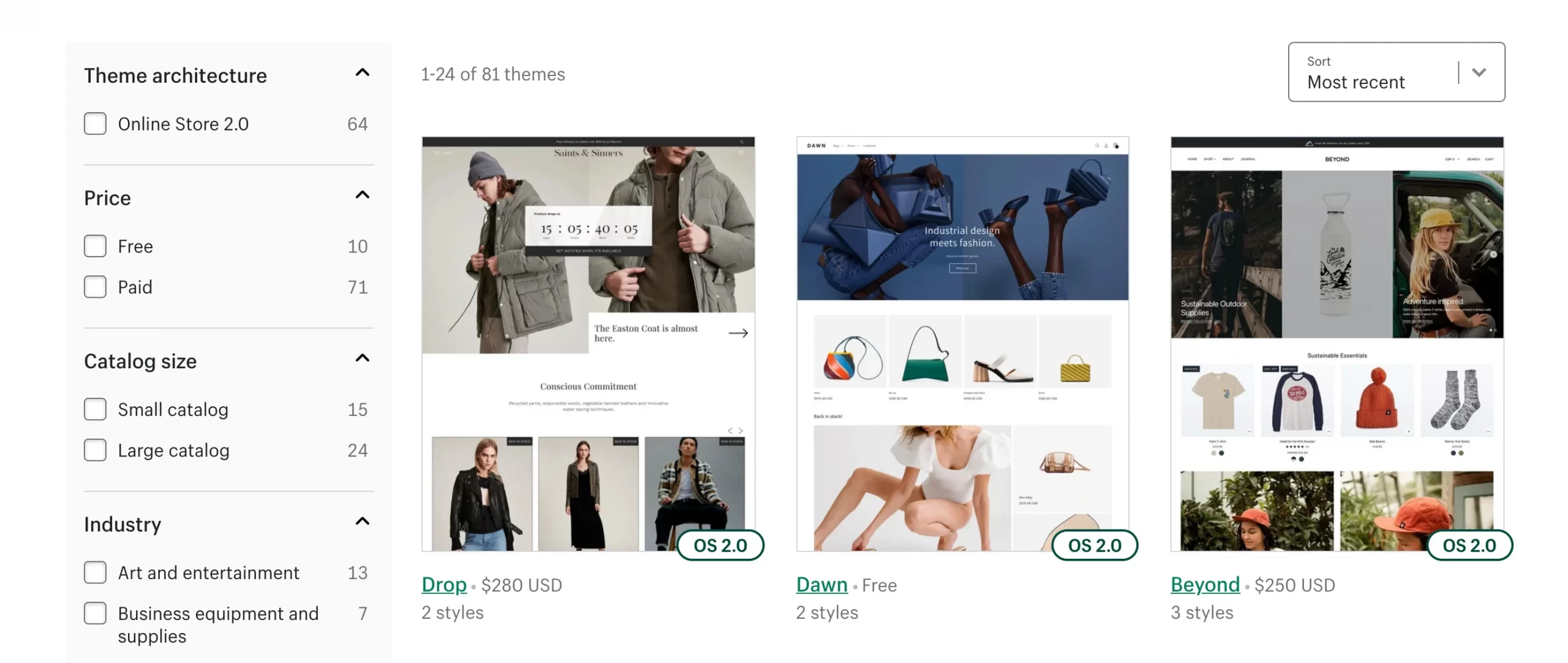
Etsy Design flexibility
In contrast, your store will follow Etsy’s layout and design. The lack of design interference is sometimes a good way to get rid of worries. You can rest assured that Esty will always apply the best it can give to make your store clean, responsive and attractive.
You don’t have any room for customization on Etsy. All you can do is fill in your store name, upload logo and product images, and add descriptions.
Very clear that, with these few options on Etsy, it’s hard to make your store the center of attention in terms of design.
Product selection
Quick verdict
While Shopify doesn’t have any restrictions on the number or type of products, Etsy only allows handcrafted, unique, and distinctive products. Therefore, Shopify deserves a strong win this round.
Shopify product selection
When selling on Shopify, there are no restrictions on types and number of products. Instead, it’s possible to sell any type of product (physical goods, digital products, subscriptions, etc.) without the existence of quantity limits. In other words, Shopify allows you to sell any type of product and service, as long as it’s legal.
Etsy product selection
If you are considering Shopify vs Etsy for digital products, the latter is not a suitable option.
There are regulations on what types of products you are allowed to sell on Etsy. This is mainly to guarantee that Etsy is a marketplace of distinctive, including handcrafted, vintage, and unique products. Therefore, if you want to list anything to sell on Etsy, it should be vintage, handmade, or craft supply.
Domain & URL structure
Quick verdict
If you want to create a custom domain name at an annual cost, it’s definitely Shopify. Otherwise, you can choose Etsy for free.
Shopify
When you sign up to sell on Shopify, you’ll be prompted to choose a domain name for your store. During the trial time, your website’s address includes an additional “myshopify.”
You may not like the address, but after you choose a plan, you’ll get your personalized domain name right away without the “myshopify” in the middle. It also means you own the domain, which is unique to your website and serves as a vital aspect of your brand. On Shopify, custom domain name costs are on a per-year basis.
It should look like this:
[wptb id=69339]
Shopify promotes the use of custom domains for your websites. It’s an important aspect of establishing your brand’s credibility, recognition, and professionalism. In comparison to retailers in a shared area, it also makes it much easier for customers to find your websites. Having a standalone website with a custom domain allows you to devote more time and effort to SEO, which is critical for long-term success.
Etsy
If you’re selling on Etsy, you won’t be able to use a custom domain as Shopify does. Instead, your shop’s URL should be something like www.etsy.com/shop/shopname. This could lead to circumstances where customers are required to browse pages before visiting your store.
Scalability
Quick verdict
Both Shopify Plus and Etsy Plus are capable of enabling your business’s scalability. In terms of pricing, Etsy Plus is more affordable.
Shopify
When your business grows bigger, you can easily upgrade your Shopify plan to Shopify Plus. This option will provide you with tons of superb features to scale up and flourish. Click on the provided link for some key features of Shopify Plus in comparison with Shopify.
Etsy
You can choose to pay for the upgraded version of Esty, Etsy Plus, and get an expanded set of tools to help jump-start growth and express your brand.
Besides, thanks to the online marketplace nature, you are able to sell on both your online store and Etsy marketplace to quickly make your business thrive. The ability to manage inventory and orders is more convenient when integrating your online store with Etsy. An Etsy listing tool not only helps to integrate Etsy with your Shopify store but also reduces tons of repetitive work.
Help & support
Quick verdict
When it comes to the Help & Support option, it’s Shopify outcomes its rival easily.
Shopify Help & Support
People at Shopify are enthusiastic about helping sellers to have their problems solved quickly. For upper plans, you can even access support from your own support team. Shopify offers help on different channels to select the best option for you. Specifically, it offers:
- 24/7 phone support;
- Social media support;
- 24/7 live chat support;
- Community forum;
- Email support;
- Help Center;
- Video tutorials;
- Advanced specialist support.
Etsy Help & Support
With Etsy, the options are less diverse. You can find answers to your problems at the Help Center, where information is displayed very cleanly and clearly. Etsy has an active forum where you can join discussions and receive great advice from other users. Email or direct phone contact is also on the list you can rely on for support. However, in recent years, sellers have encountered subpar customer service, and if you prioritize good seller support, you may consider other platforms like Etsy.
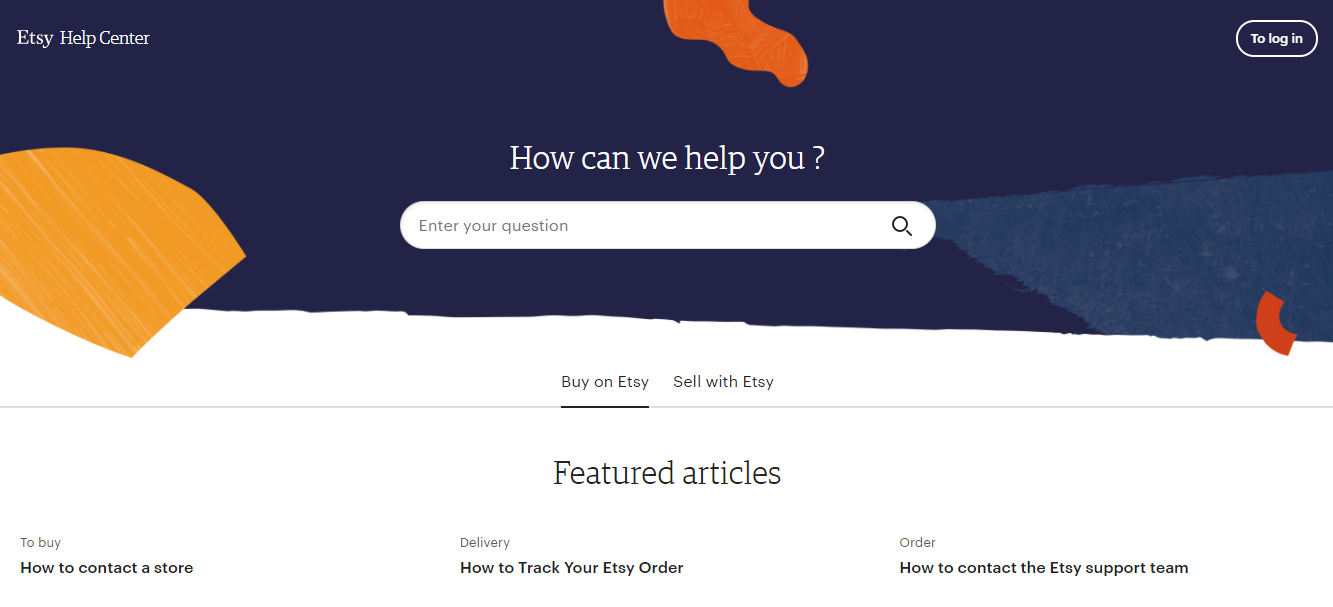
Etsy or Shopify: Which is Best for Your Business?
With the above-mentioned differentiation pointed out and explained, we still can’t give a one-size-fits-all to the question, “Is Shopify or Etsy better?”. The answer mostly relies on how you want your online business to be.
If you want to build a unique and strong brand identity or are looking to scale up your business to other sales channels, Shopify is the optional option. Additionally, since Shopify doesn’t charge any listing fees at all, those with several dozen products will definitely choose Shopify over Etsy.
On the contrary, Etsy is a perfect choice if you are on a tight budget. Anyone who registers for an Etsy account will automatically subscribe to Etsy’s default plan, Etsy Standard, and pay no fee at all. Plus, with a pre-made customer base, eCommerce beginners who are not familiar with SEO & marketing techniques will not have to pay that much attention to attracting customers to your online store. Merchants with crafts, art, or handmade goods will also find Etsy a more suitable option for their business.
Can You Have Both Shopify and Etsy?
Definitely Yes! Using both Shopify vs Etsy for your business is literally the definition of synergy. This is super effective when you want to diversify your presence on the internet. Combining the use of Shopify vs Etsy helps you reach more audiences and make the most of the famous marketplace.
By using the Etsy Marketplace Integration app, you can easily integrate the Etsy marketplace with your current Shopify store. This integration is free for the first seven days; after that, you have to pay per month.
Shopify vs Etsy: FAQs
[sp_easyaccordion id=”48497″]
Etsy vs Shopify: Final Words
Finally, we have delivered everything you need to know about Shopify vs Etsy. Is Shopify better than Etsy? We bet that, by this moment, you have figured out that choosing a winner for Shopify vs Etsy is not the fixed goal by looking at how they function.
One as a dedicated eCommerce platform provides you the ability to flourish business with your own brand. The other, as a marketplace, allows you to keep it simple selling online, focusing on the product’s distinctive.
It’s not by chance they have earned such eradicating reputations after all these years. Shopify and Etsy shine in their own ways, but they are definitely not one-fit-all-size solutions. Therefore, there’s time you want to switch to other platforms for the better sake of your business. And that’s when you can rely on LitExtension – #1 The World Shopping Cart Migration Expert.
Up to now, we have successfully migrated 280,000+ stores with 150,000+ customers worldwide. At LitExtension, we offer an advanced automated tool that transfers all your data securely and flawlessly from Etsy to Shopify.
For more information about how we can support your migration, feel free to contact our support team anytime you like, on a 24/7 basis.
You can also check out our LitExtension blog and join our community for more helpful eCommerce information.
